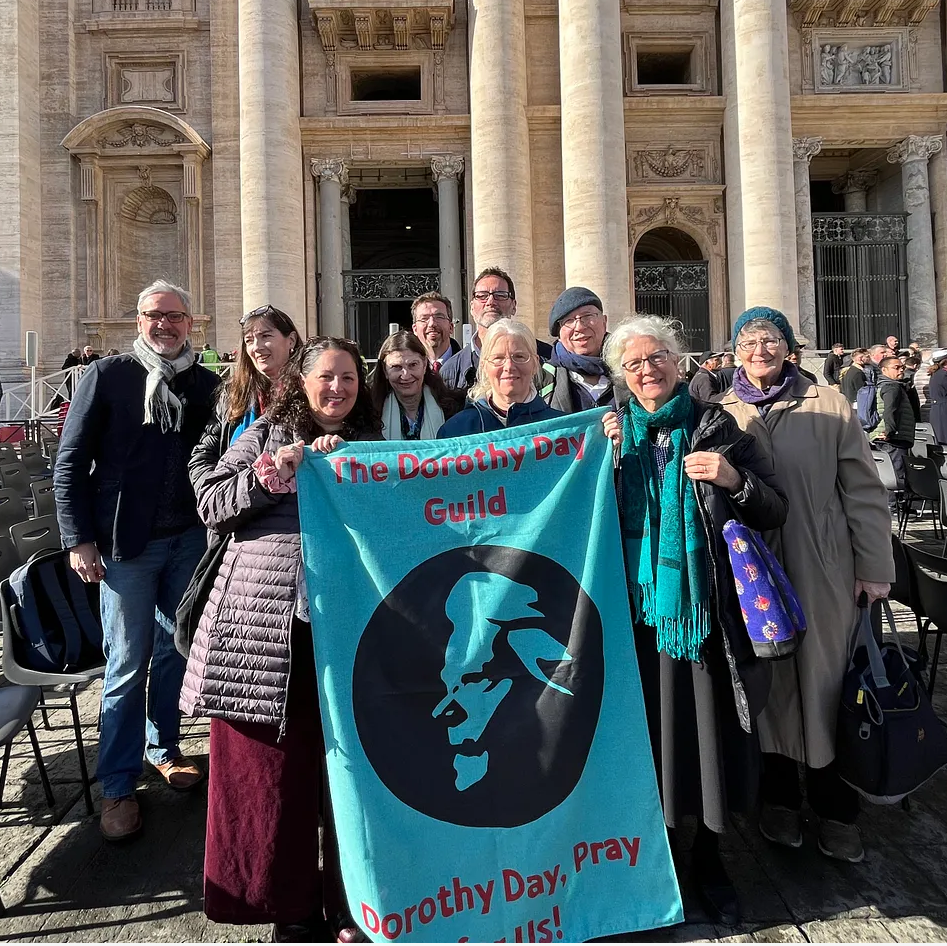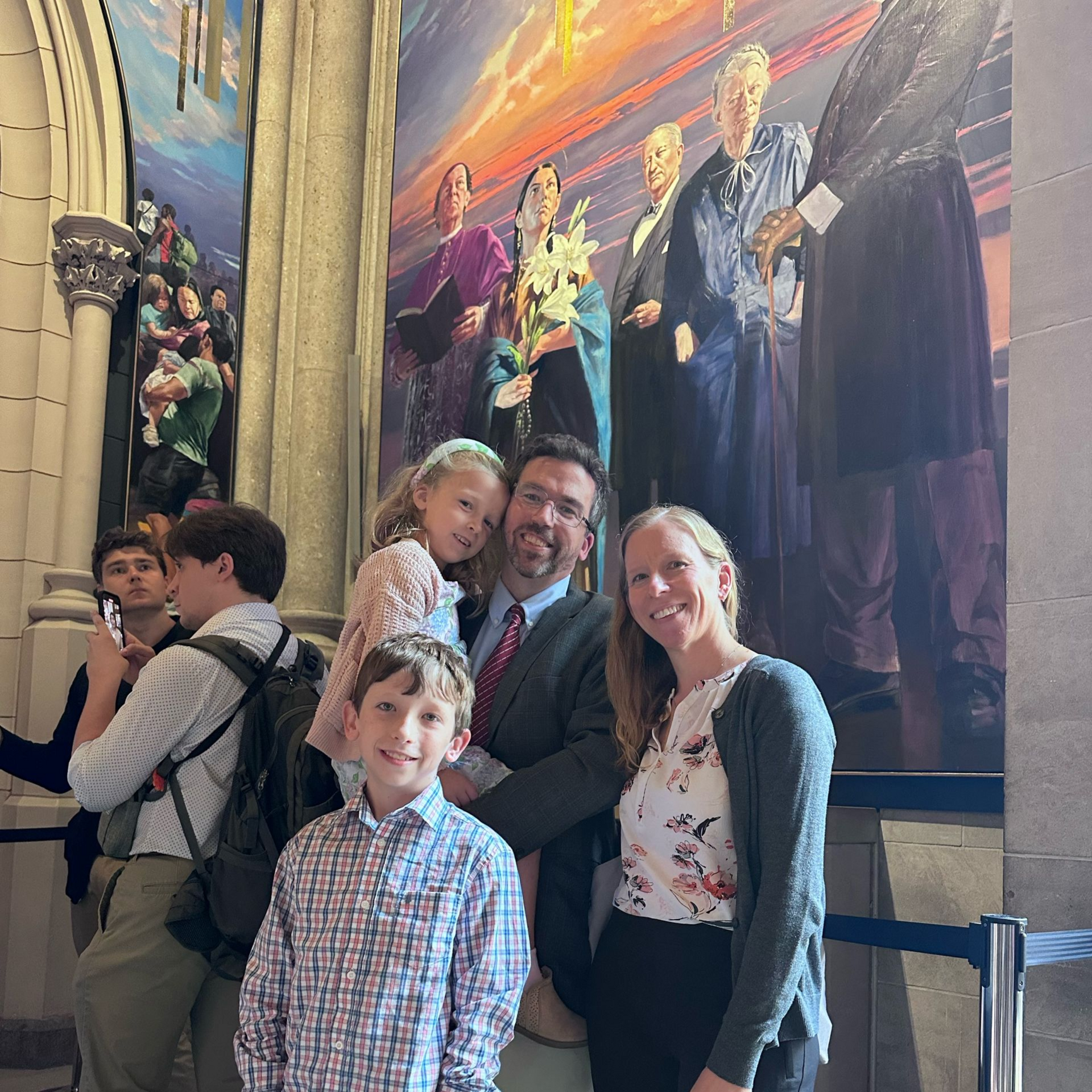Holy Week with Dorothy
Dear friends and members of the Dorothy Day Guild,
Holy Week is finally here! The long season of Lent is drawing to a close, and we are quickly approaching the sacred Paschal Triduum. We hope that these past weeks have been spiritually fruitful for each of you– it’s been great to be with so many of you over the past month, online and in person, and we have a lot we’re excited to share with you here.
Guild news and other updates:
March was a busy month for the Guild! In addition to hosting several walking pilgrimages through lower Manhattan, we also began the month with the first meetings of our online book club, where we read through Robert Ellsberg’s Dorothy Day: Spiritual Writings over the course of five Sunday evenings. This was a wonderful experience, and we were so grateful to have Robert’s expertise guiding us through some of Dorothy’s classic and lesser-known writing, as well as the thoughtful questions and reflections offered by members of the reading group each Sunday. We hope to offer another reading group this summer, so stay tuned for more info!
We also hosted our first-ever Dorothy Day Symposium on March 28th and 29th. “Dorothy Day: Practices of Peace in the Year of Jubilee,” a hybrid in-person and virtual event, welcomed participants to Maryhouse and Manhattan University and featured roundtables by Catholic Workers and other peacemakers, students, and academics from five different states!
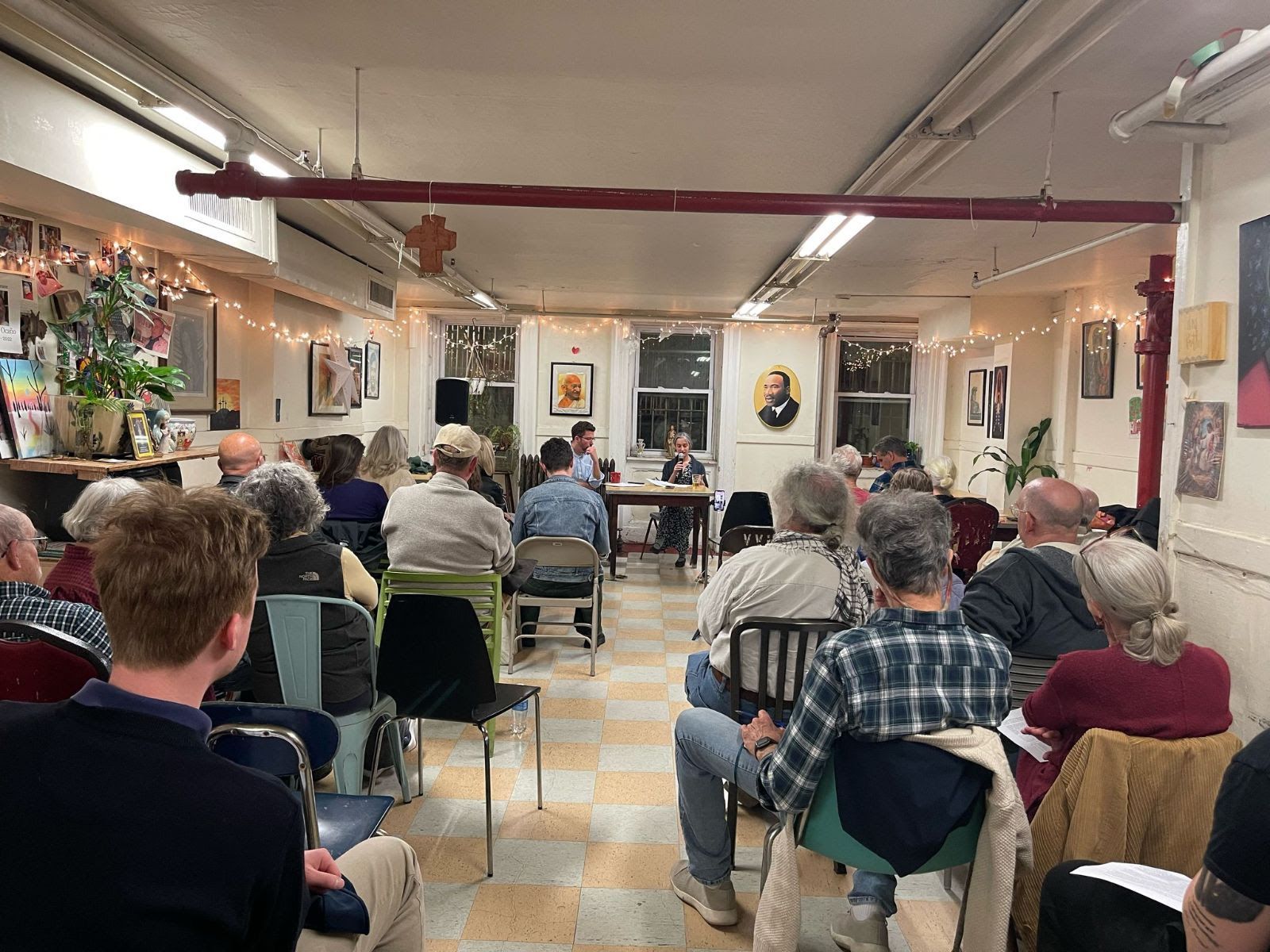
Kevin Ahern and I were honored to be invited to kick off the Symposium at the Maryhouse Friday Night Meeting, where we gave a joint talk entitled “Dorothy Day: A Pilgrim of Hope in an Age of Despair and Presumption.” In Spes non confundit, the “bull of indiction,” with which Pope Francis introduced the Jubilee Year last May, the Holy Father offered us eight signs of hope to look out for and a challenge to undertake them ourselves. Those signs are:
- Work for peace
- Celebrate life “a future filled with the laughter of babies and children”
- Outreach and pardons for prisoners
- Visiting the sick
- Care for young people
- Welcoming migrants
- Caring for the elderly
- Caring for the “billions of the poor, who often lack the essentials of life.”
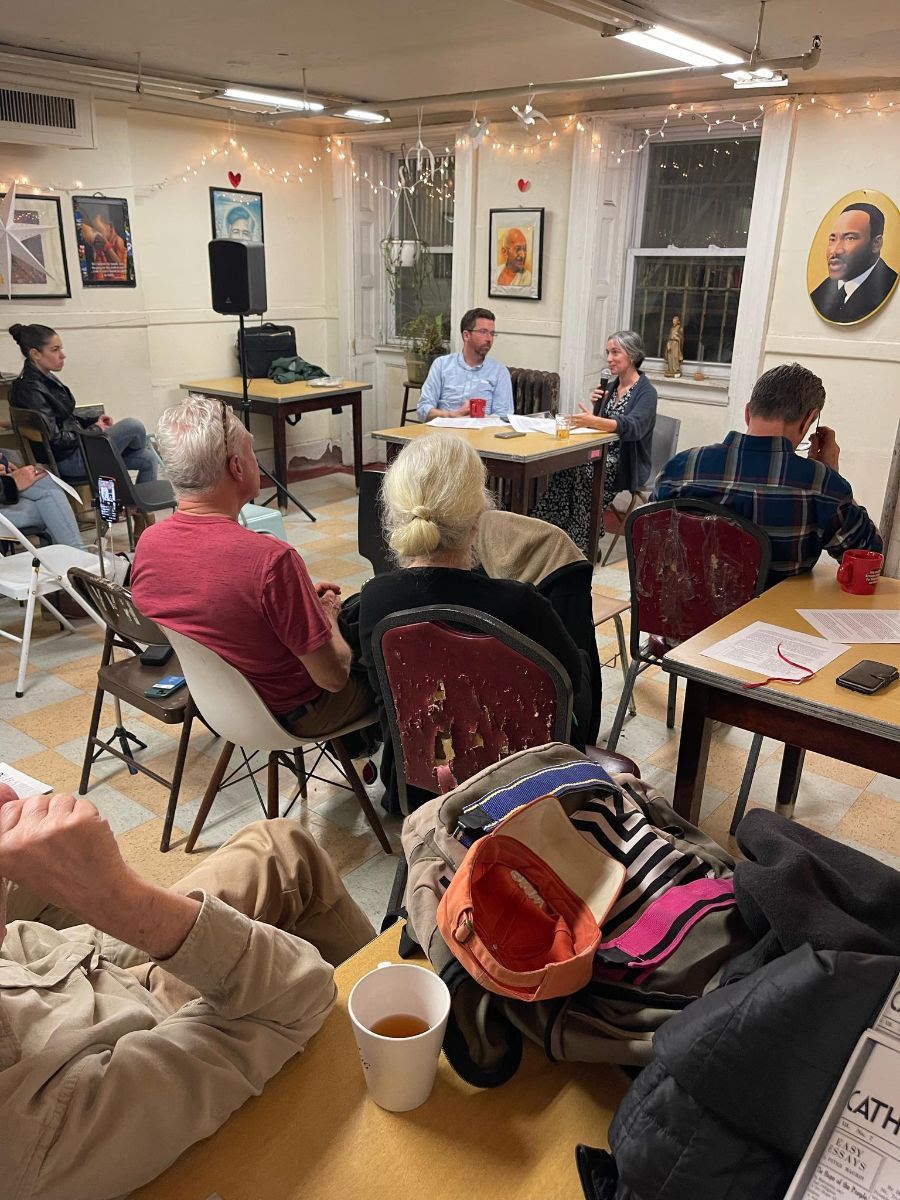
We see all of these signs present in the life and work of Dorothy, and in the living legacy of the Catholic Worker movement. We know that many of your families and communities are right now experiencing challenging times of economic hardship, uncertainty about employment and immigration status, and anxieties for friends and relatives in war-torn areas of our world. These times tempt us to despair, but we also know that the Gospel is constantly being enacted in the very places which seem to be most impoverished and threatened. Dorothy reminds us of this reality, as does Pope Francis.
We invite you to check out the talk, and follow along with this handout that Kevin shared at the Friday Night Meeting, and above all, keep watch for these eight signs of hope! We are now in the week of Christ’s Passion, but the resurrection is at hand.
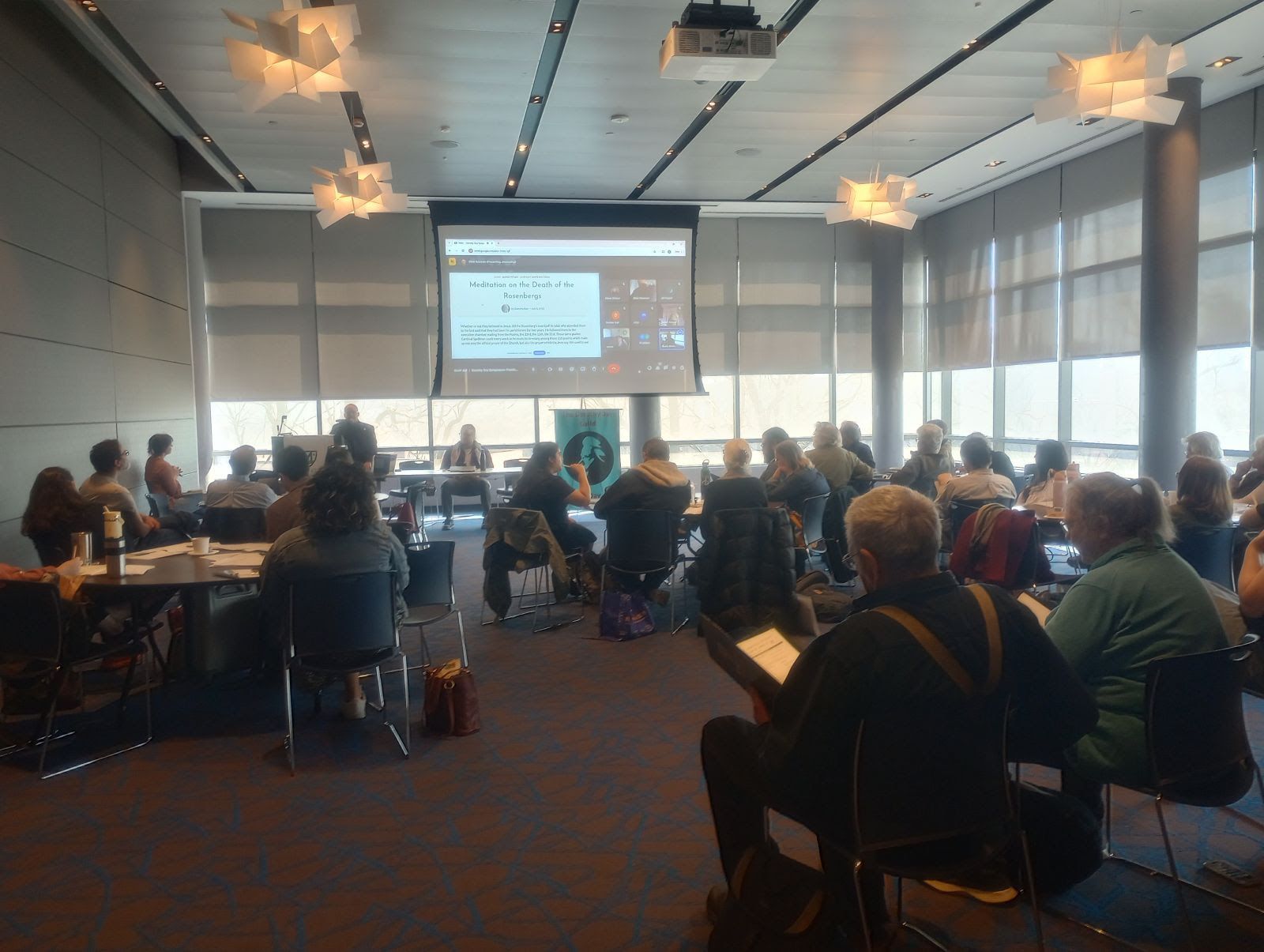
The following morning, we gathered at Manhattan University for bagels, pastries, and coffee to pray the liturgy of the hours together and then hear Robert Ellsberg’s opening remarks on “Dorothy Day and the Future of Theology,” with a response from Magdalena Muñoz Pizzulic. The five panels which followed in the late morning and then picked up after lunch featured conversations on Dorothy as a prophet, peacemaker, worker, and lay exemplar of holiness “in the world.” Renée Roden, who moderated one of the roundtable discussions, offered a brief write-up of the Saturday events for Roundtable, noting the distinctly inter-generational and inter-faith character of the conversations, all of which
“highlighted a way in which Day’s life held a prophetic witness for the Catholic Church—and the entire globe—in tackling the pains and struggles of the twentieth century. As [Sean Domencic, of the Rechabite Catholic Worker, who presented at one of the roundtables,] noted, many of Day’s pressing concerns: peace, the universal call of all the people of God to holiness, her ecumenism, and her commitment to the robust social reform based on a life lived in the liturgy of the church, were also key concerns of the Second Vatican Council.”
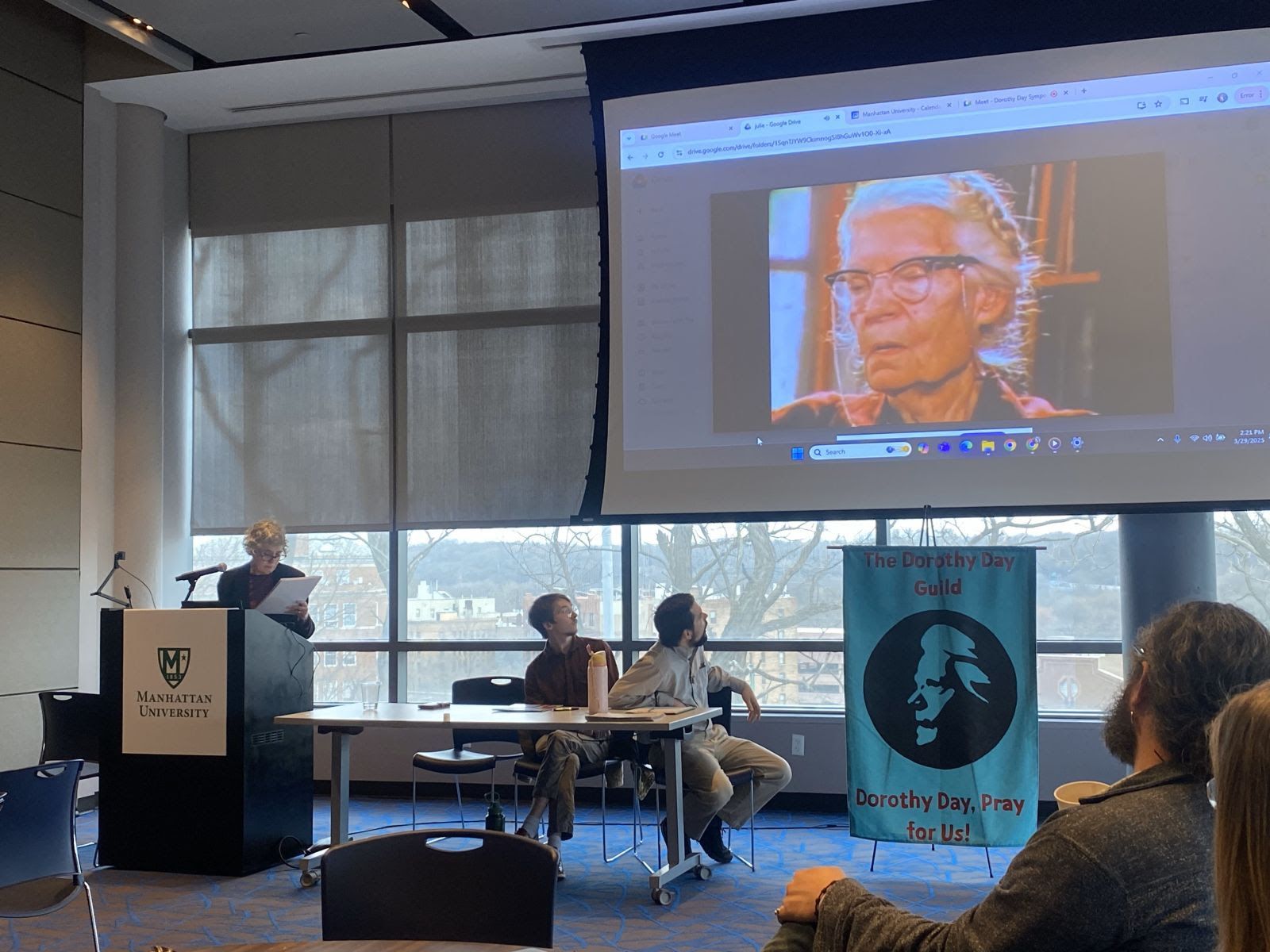
For Italian-language speakers, Giulia Galeotti, one of our panelists, wrote a story for the Vatican News, “In cammino con Dorothy Day nell’anno del Giubileo” (“Walking with Dorothy Day in the Jubilee Year”), introducing Dorothy and the Catholic Worker movement in the context of the Jubilee and detailing some recent activities of the New York Catholic Worker community and the Dorothy Day Guild, including the Symposium.
After our final roundtable on Dorothy and lay vocation, featuring Martha Hennessy, Graceann Beckett, and Gráinne Malone, we closed out the Symposium by celebrating a vigil mass in Manhattan University’s Chapel of the Holy Infancy and then returning to the Dorothy Day Center for a family-friendly pizza dinner. If you weren’t able to attend the Symposium, check out the Dorothy Day Guild’s Instagram page to watch a few of the panels and roundtable discussions, including the Friday night meeting we hosted at Maryhouse. We plan to edit a few of these conversations for our Youtube channel as well, so keep an eye out– we are so excited to continue developing educational resources for you to share with your communities!
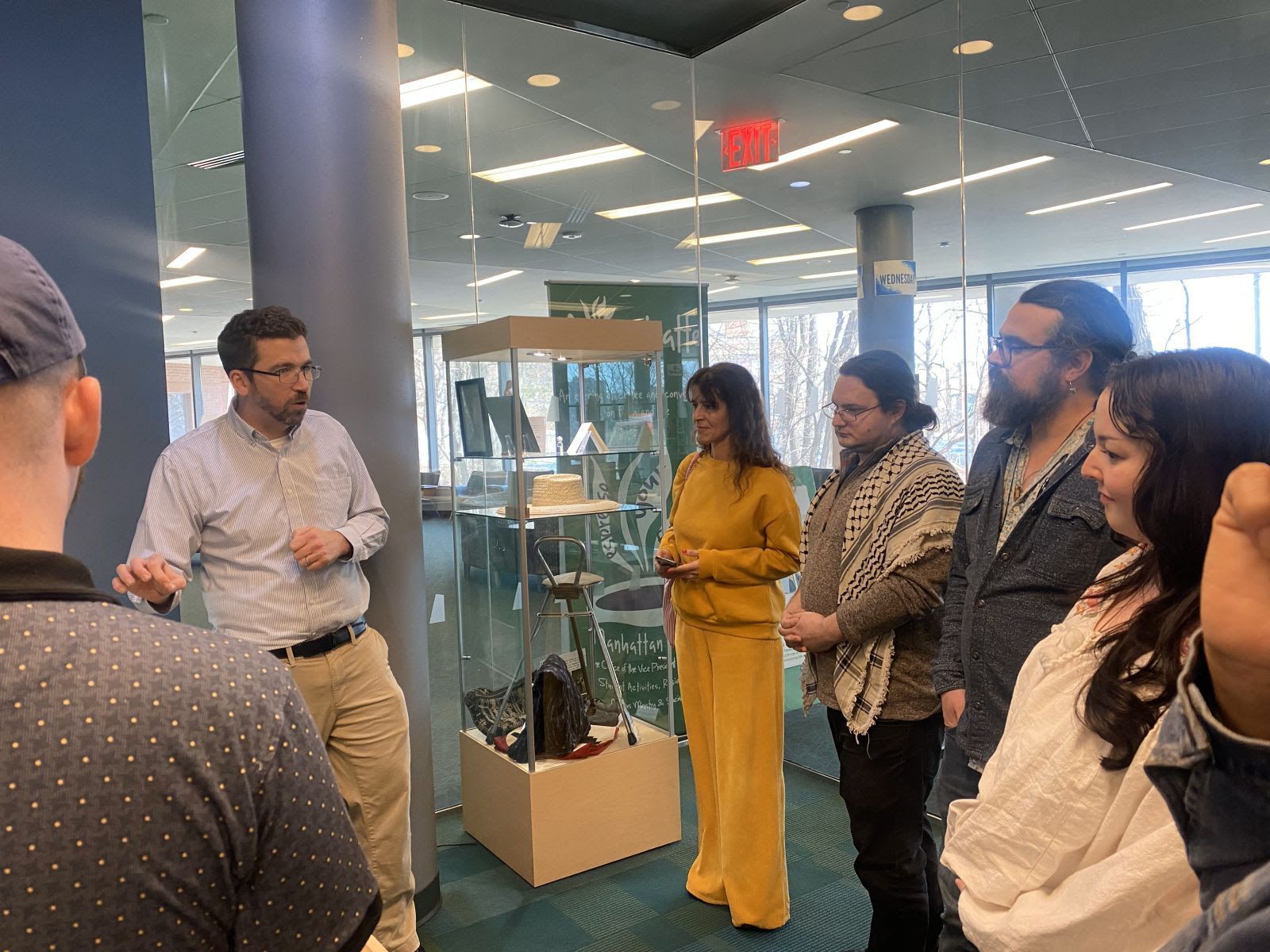
Most recently, we were so excited to host our first event in South Bend, Indiana. The Dorothy Day Guild was very proud to co-sponsor a production of Lisa Wagner-Carollo’s Haunted by God: The Life of Dorothy Day on April 4th at Our Lady of the Road, the drop-in center run by the St. Peter Claver Catholic Worker community.
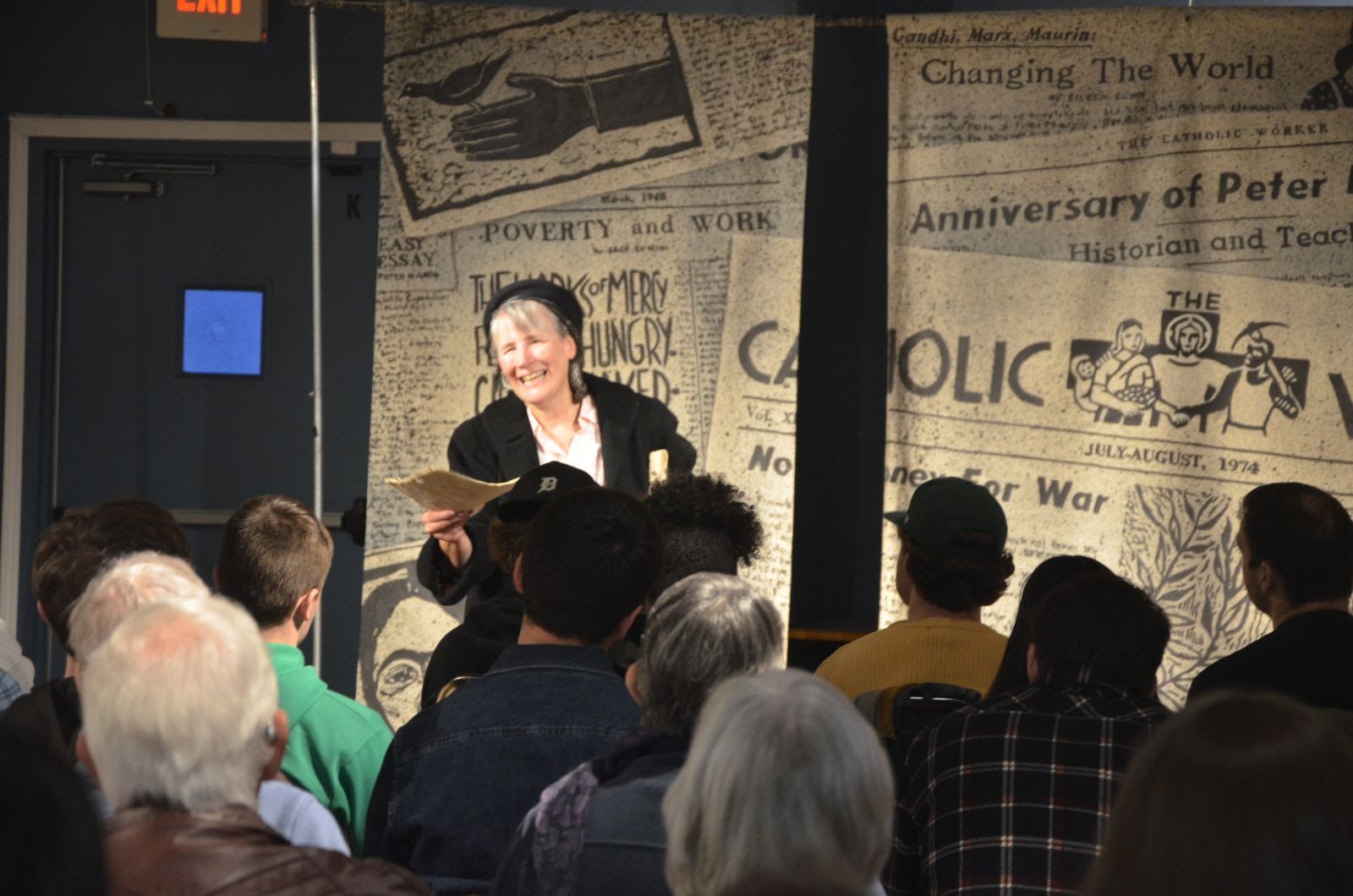
For this event, we welcomed a diverse audience of students from the University of Notre Dame, members of the Guild, friends of the local Catholic Worker house, and guests who frequent Our Lady for breakfast, laundry, and showers on weekend mornings.
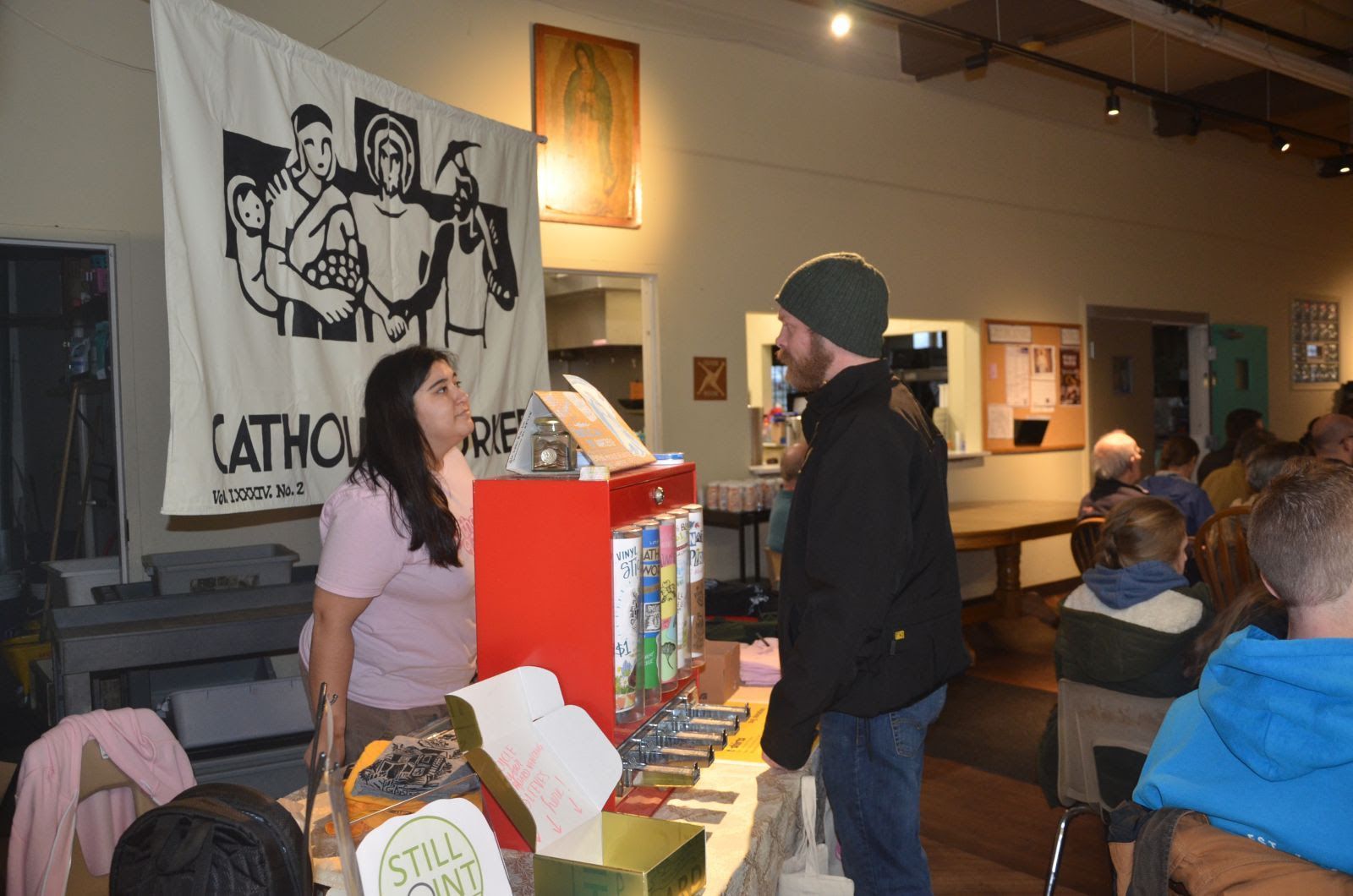
Hosting this production in a space where the works of mercy are offered every week was a particularly moving experience, and we all enjoyed Lisa’s post-performance Q&A and the reception afterwards. Our young friend Dory (named for Dorothy!) was particularly excited to bring her Dorothy doll along with her to see the play and share some chocolate cake!
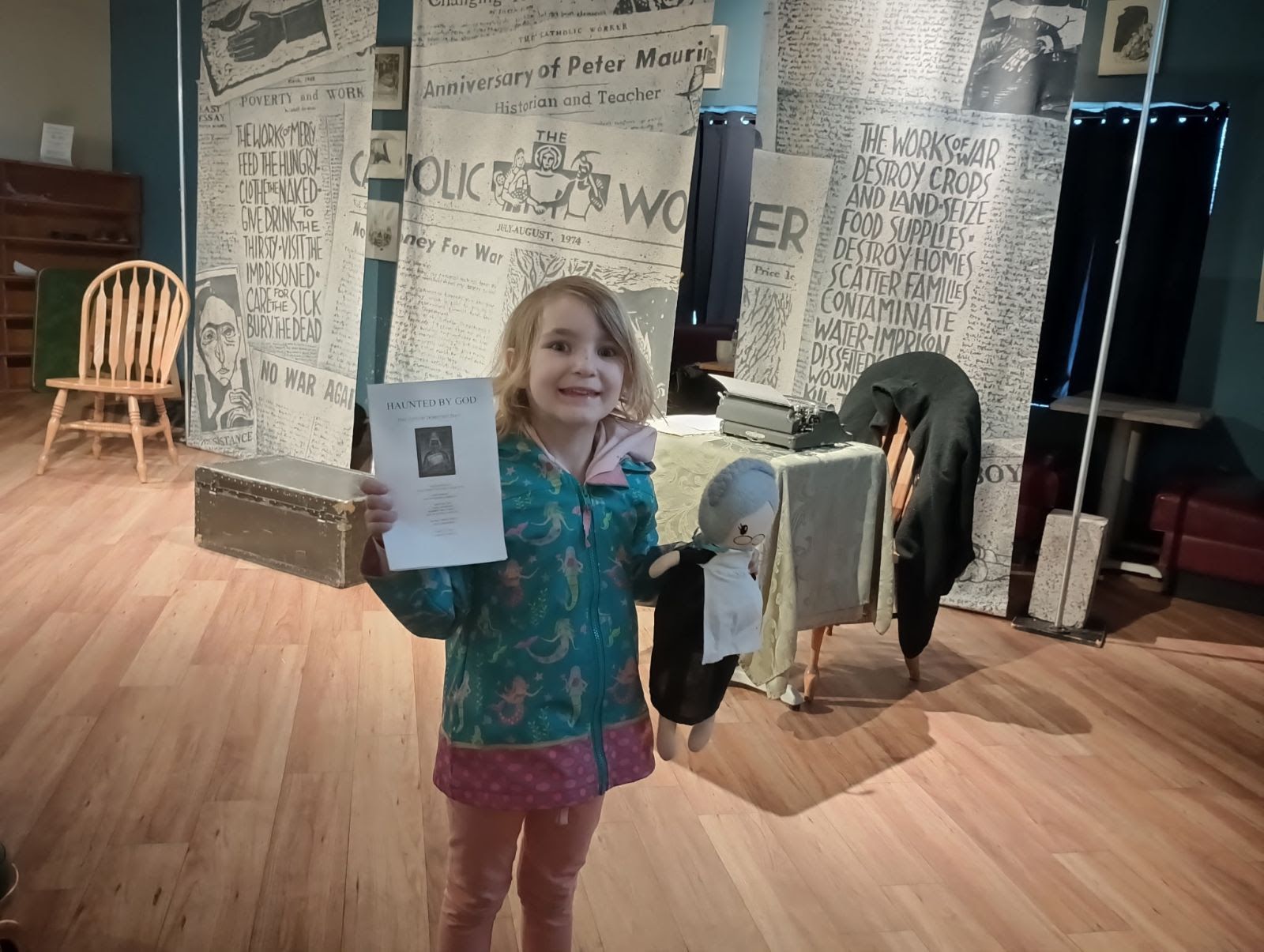
All of us were so impressed with the stunning, simple set design, and Lisa’s passionate portrayal of Dorothy. Much of the text of the play is drawn directly from Dorothy’s own writings, and Lisa’s engagement with the audience draws viewers right into the moments and relational encounters that shaped Dorothy’s life. If you would like to bring Haunted by God: The Life of Dorothy Day to your school, parish, or community, we highly encourage you to reach out to Lisa at Stillpoint Theatre Collective. As we approach the forty-fifth anniversary of Dorothy’s passing from this life in November, this performance is a great way to introduce new audiences to a contemporary exemplar of holiness.
We were delighted to host a full slate of in-person and online programming during the Lenten season. We’re planning to catch our breath and take a quick break for Holy Week and the first days of Easter, but keep an eye out for some upcoming spring and summer events, beginning with our April 26th walking pilgrimage for members of Pax Christi.
Many of you were able to join our friends at the Church of St. Ignatius Loyola in New York for mass on March 30th, where Robert Ellsberg received the Loyola Medal, the parish’s highest honor, largely for his extensive work supporting Dorothy’s canonization cause and his promotion of her unique witness to the Gospel. The parish has made a livestream recording of the mass, including the award ceremony, which begins at minute marker 38:50, available on the Church of St. Ignatius Loyola Youtube channel. You can also click here to read a transcript of the award ceremony.
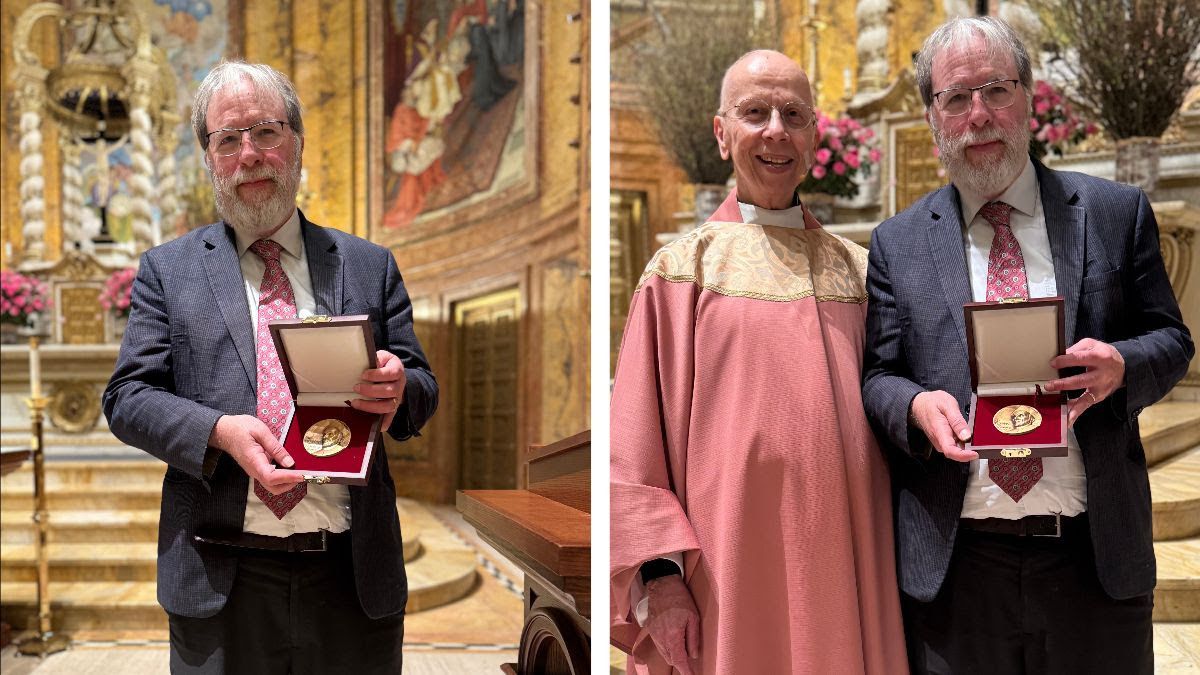
The following evening, Robert delivered the Laetare Lecture, “The Long Pilgrimage of Dorothy Day,” offering a reflection on Dorothy’s journey of faith, the trials of daily life, and the historical challenges that shaped her witness. The lecture begins at minute marker 12:37 of this video. Congratulations, Robert, and thank you so much for all you have done to share Dorothy’s legacy of Gospel nonviolence, voluntary poverty, and hospitality with the Church and with our world.
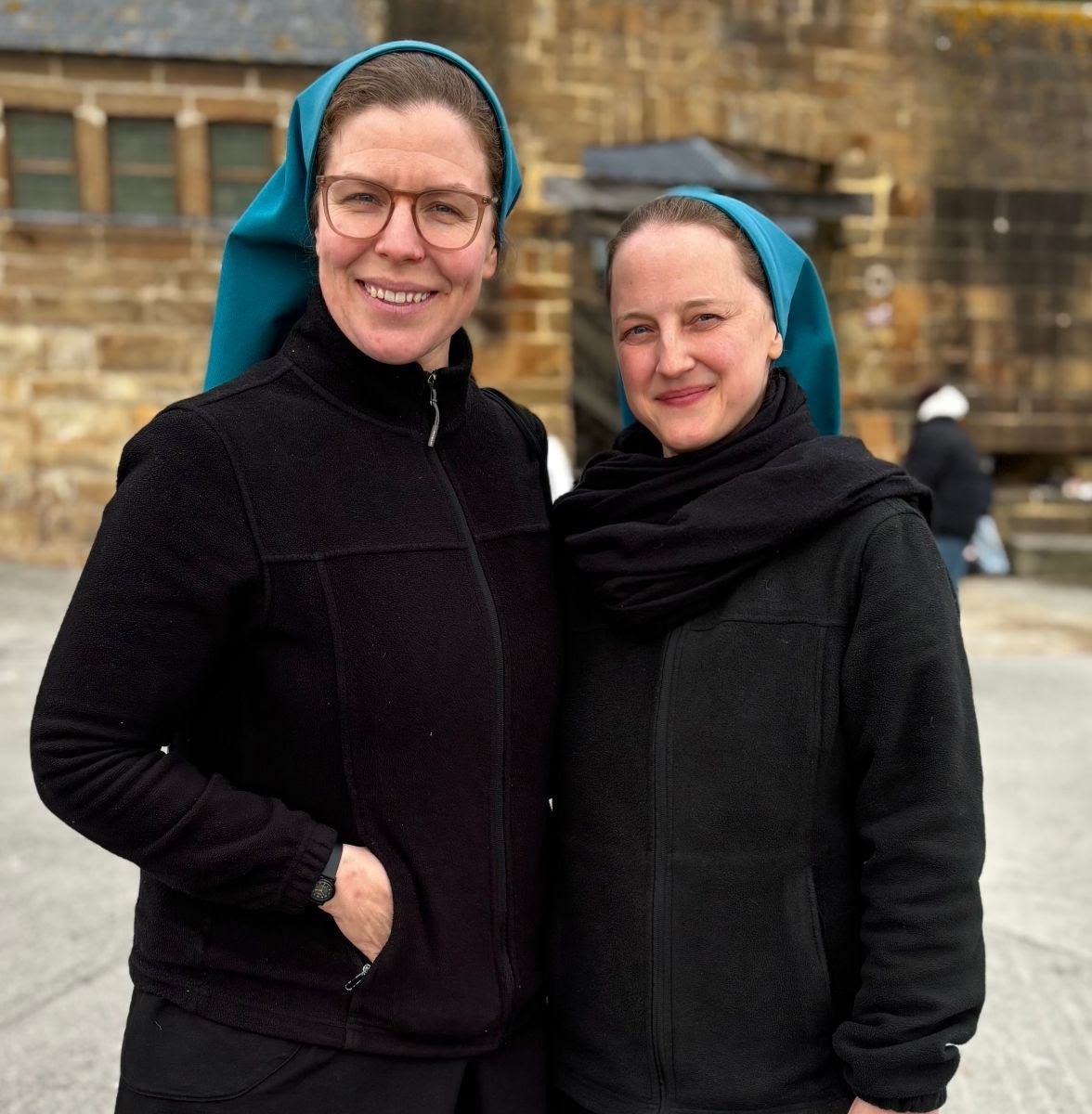
Finally, we would like to offer our prayers for the Sisters of the Little Way as they settle into their new home in the diocese of Lexington, Kentucky. The Sisters of The Little Way, who were formed as three former members of the Daughters of St. Paul discovered “a call within a call” to serve on the margins of the Church, are a new private association of the faithful who have adopted Dorothy as one of their patrons.
The Sisters were invited to establish their community in the diocese of Lexington by Bishop John Stowe, OFM, who felt that their charism of evangelization, ministry to the poor, and outreach to those who have been wounded or abused by members of the Church would support and complement the important work already being done in those apostolates in the Lexington diocese. Bishop Stowe has supported the Sisters of the Little Way in their process of becoming officially recognized as a religious institute by the Vatican and has been a great supporter of Dorothy’s canonization cause as well, last year accepting the Dorothy Day Peacemaker award on behalf of Pax Christi and attending the Joshua Casteel Memorial Peace Dinner at the USCCB November meeting.
Congratulations to the Sisters of the Little Way on this exciting new transition! We wish you all the best as you continue living out your mission in Lexington!
Reading and watching recommendations:
For the Spring 2025 issue of
Notre Dame Magazine, Renée Roden published an article detailing Dorothy’s connections with university students, faculty, and staff from the 1940s through the 1970s.
Dorothy visited the University of Notre Dame and the city of South Bend on a number of occasions over those decades, eventually coming to campus to receive the Laetare Medal after university president Father Theodore Hesburgh pressed her to accept the honor after she attempted to refuse it.
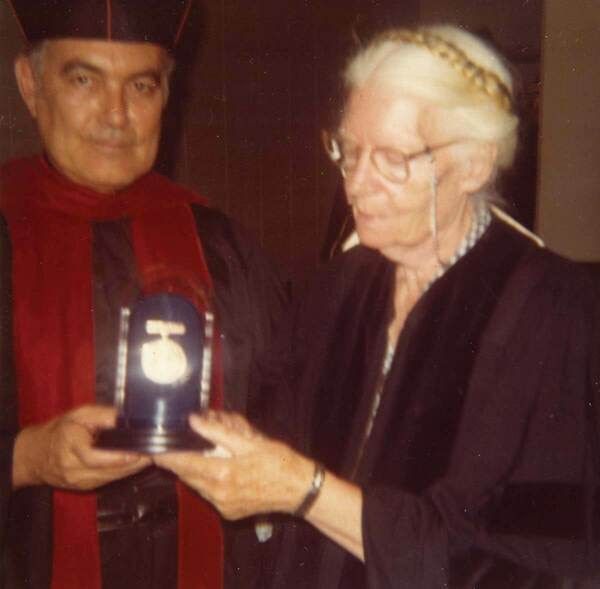
At the St. Peter Claver Catholic Worker house, we were particularly interested to read more about Dorothy’s visit to the first Catholic Worker house in South Bend, which was founded by Julian Pleasants and Norbert Merdzinski, two Notre Dame students, in April of 1941 after visiting the Catholic Worker community in New York the previous summer. Julian had actually transferred to Notre Dame after subscribing to The Catholic Worker and finding that many of the authors quoted in the paper were priests or theologians teaching at the university. Dorothy’s first speaking engagement at Notre Dame came at Julian’s invitation, although
The administration did not want to publicize the talk, Pleasants said. The students were not allowed to put up posters advertising Day’s visit. In those days, activism on behalf of the poor and of working people could indicate Communist sympathies, and Pleasants guessed administrators wanted to keep the news from potentially squeamish donors.
Despite the event’s low profile, several hundred students turned out to listen to Day in Washington Hall.
Thirty years later, 11,000 people were present as Dorothy received the Laetare Medal at the university’s commencement ceremony, and a succession of communities have kept the Catholic Worker movement alive and active in South Bend over the past eighty years. Our current community is located less than a mile from the spot where Julian and Norbert first opened Saints John and Paul House of Hospitality. We are very proud to be part of this legacy– thank you, Renée, for sharing this history with the friends and members of the Guild!
Speaking of the University of Notre Dame, we recently learned about a new project planned for the spring of 2026, the “Dorothy Day and Thomas Merton Culture and the Public Good annual symposium,” which has been funded by the Franco Family Institute for Liberal Arts and the Public Good. We’ll let you know as soon as we have more information about this event, but we hope many of you will submit abstracts and participate in the symposium!
Earlier this year, we shared Michael Baxter’s article for the Houston Catholic Worker, “Living Beyond Politics: A Post-Election Reflection on Dorothy Day,” and last week, the OSV podcast Catholic in America released a follow-up conversation between Michael and host Jason Adkins for the episode “Dorothy Day, Politics, and the Catholic Way Forward.” In this episode, Michael and Jason discuss how Dorothy thought about political action at the national and increasingly local levels in her own time, and what this might suggest to contemporary Catholics looking for ways to engage in activity for the common good in the present moment.
Dorothy’s own example encourages us to think of ourselves and our neighbors as active moral agents who are capable of making real change in our immediate sphere of influence. This vision of politics as the project of organizing the communities where we live together pushes us towards action at the local level in cooperation with those near us– and as Michael notes, in the wake of the widespread destruction of federally-funded organizations which cared for the most vulnerable in our society, this vision of politics requires a great deal more from each of us than simply voting once every four years. Dorothy again offers us an example of personal responsibility:
What can I myself do today to relieve the suffering of my neighbor, who is Christ?
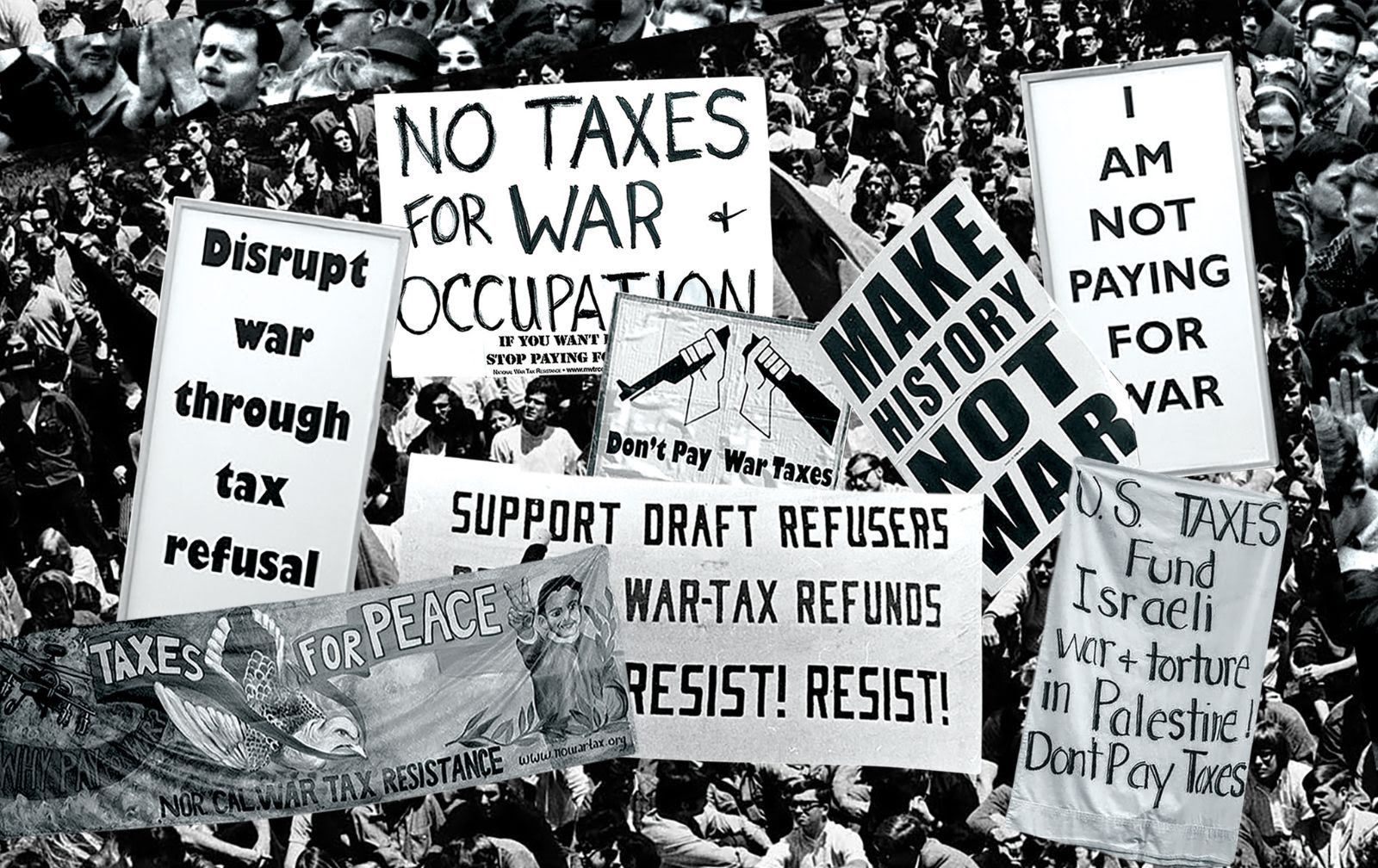
We also came across an interesting and somewhat unusual piece in Current Affairs which mentions Dorothy only briefly, but offers a fascinating, in-depth, and accessible history of one of the many practices by which Dorothy offered a counter-witness to our cultural acceptance of violence and militarism: war-tax resistance. In “Could Tax Protests Defund the American War Machine?” Lauren Fadiman writes that
According to NWTRCC [the National War Tax Resistance Coordinating Committee], the average American pays as much as 45 percent of their taxes to the military, which translates to a massive annual Department of Defense budget. The further breakdown of taxation is chilling: in 2018, the average taxpayer worked 63 days to fund the military—and 31 of those days were for the sake of Lockheed Martin, Raytheon, and other private military contractors alone. The financialization of war (the process by which banks, hedge funds, private equity, and private companies have tethered profit to conflict) poses a particular challenge to those seeking to resist war-making, as does the fact that recent wars have been funded almost entirely by debt—in no small part because explicit war taxes are unpopular, capable of dragging down support for a given war by as much as 15 percent.
What work for the common good could we instead accomplish with those sixty-three days of our labor? War-tax resisters offer a number of suggestions, including using what they would have otherwise paid in federal taxes to support good work in their own communities. “War tax resistance is an opportunity for things like mutual aid—the collaborative pooling of resources at the local level,” Fadiman writes, “and other programs and projects that cannot or do not receive support from the government. It is, in short, a way to put our money where our mouths are in the here and now.”
Tax Day in the United States is tomorrow, so we definitely encourage you to check this piece out, and visit the National War Tax Resistance Coordinating Committee’s website for additional information and resources. This article is a fantastic companion piece to Michael Baxter’s podcast interview, as it offers an example of the kind of creative thinking that can help us reimagine working together to build a new society in the shell of the old.
Finally, we were delighted to come across this short video introduction to Dorothy’s life and witness– in French! “Dorothy Day, une anarchiste sur les autels,” (Dorothy Day, an anarchist on the altars) was produced by Portal Catholique Suisse for their “Catholiques Atypiques” series. The film opens with the story of Dorothy’s arrest for resisting militarism at the first civil defense drill protest and highlights Dorothy’s connection to French-speaking holy men and women from such as Peter Maurin and St. Thérèse of Lisieux. This is a great video for language-learners and provides a solid first introduction to Dorothy’s distinct mode of living the Gospel for a francophone audience.
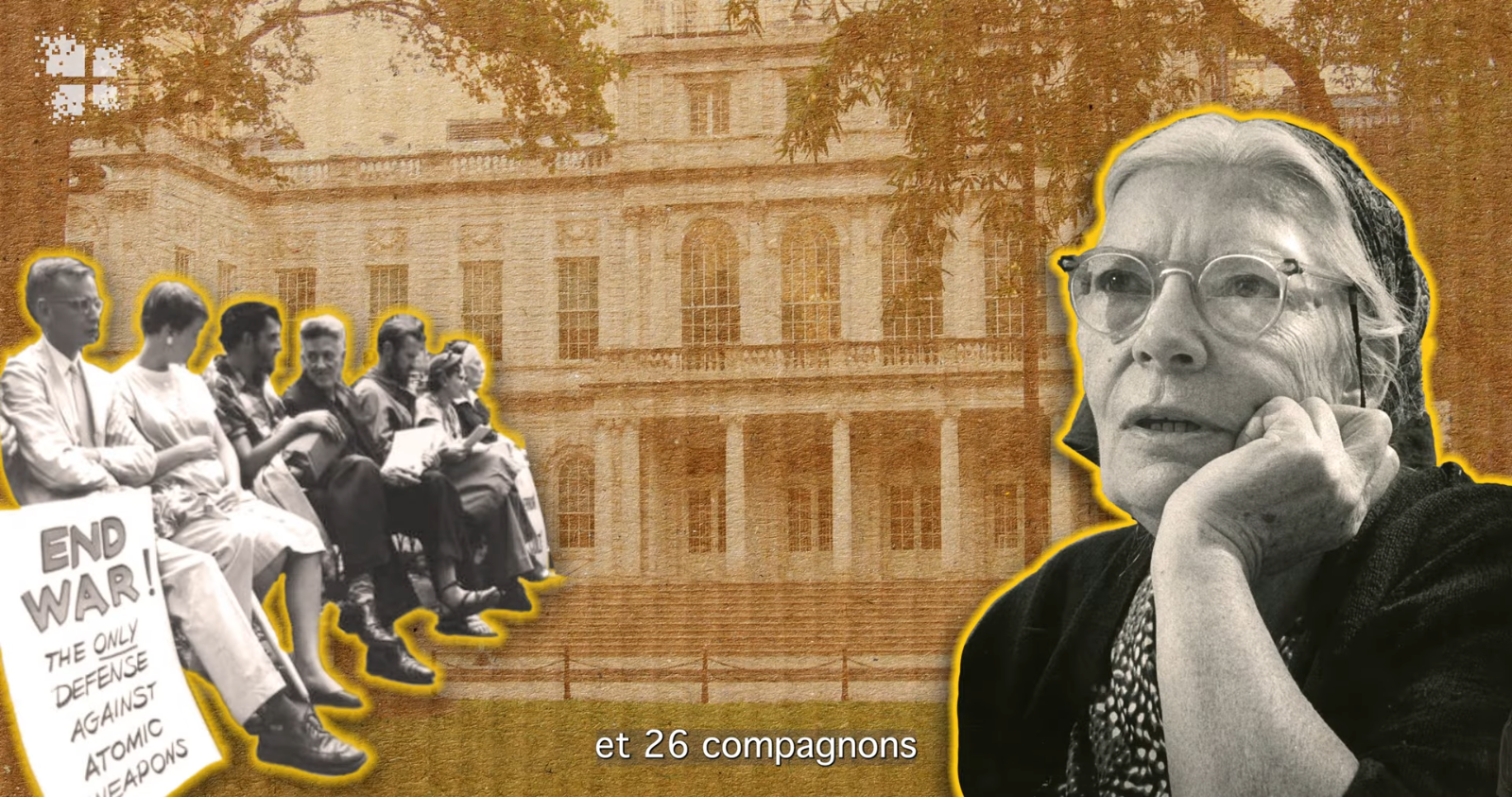
We’re always happy to find little treasures like this, so if you discover or have created a resource on Dorothy in a language other than English, please let us know! When Dorothy is eventually canonized, she will be saint for our global Church, and we’re already excited to share her story with the many communities around the world who will recognize holiness in her legacy of nonviolence, hospitality, and voluntary poverty.
Upcoming opportunities from our friends:
Tomorrow evening, several of us from the South Bend Catholic Worker plan to attend the Yoder Public Affairs Lecture at Goshen College, which this year features filmmaker Martin Doblmeier, speaking on his film series “Prophetic Voices,” which chronicles the legacy of five Catholic, Protestant, and Jewish faith leaders of the 20th century, including Dorothy. Martin’s lecture will take place on Tuesday, April 15th, at 7:00 PM at Goshen College’s Umble Center, located at 1700 South Main Street, in Goshen, Indiana and will be followed by a Q&A and reception.
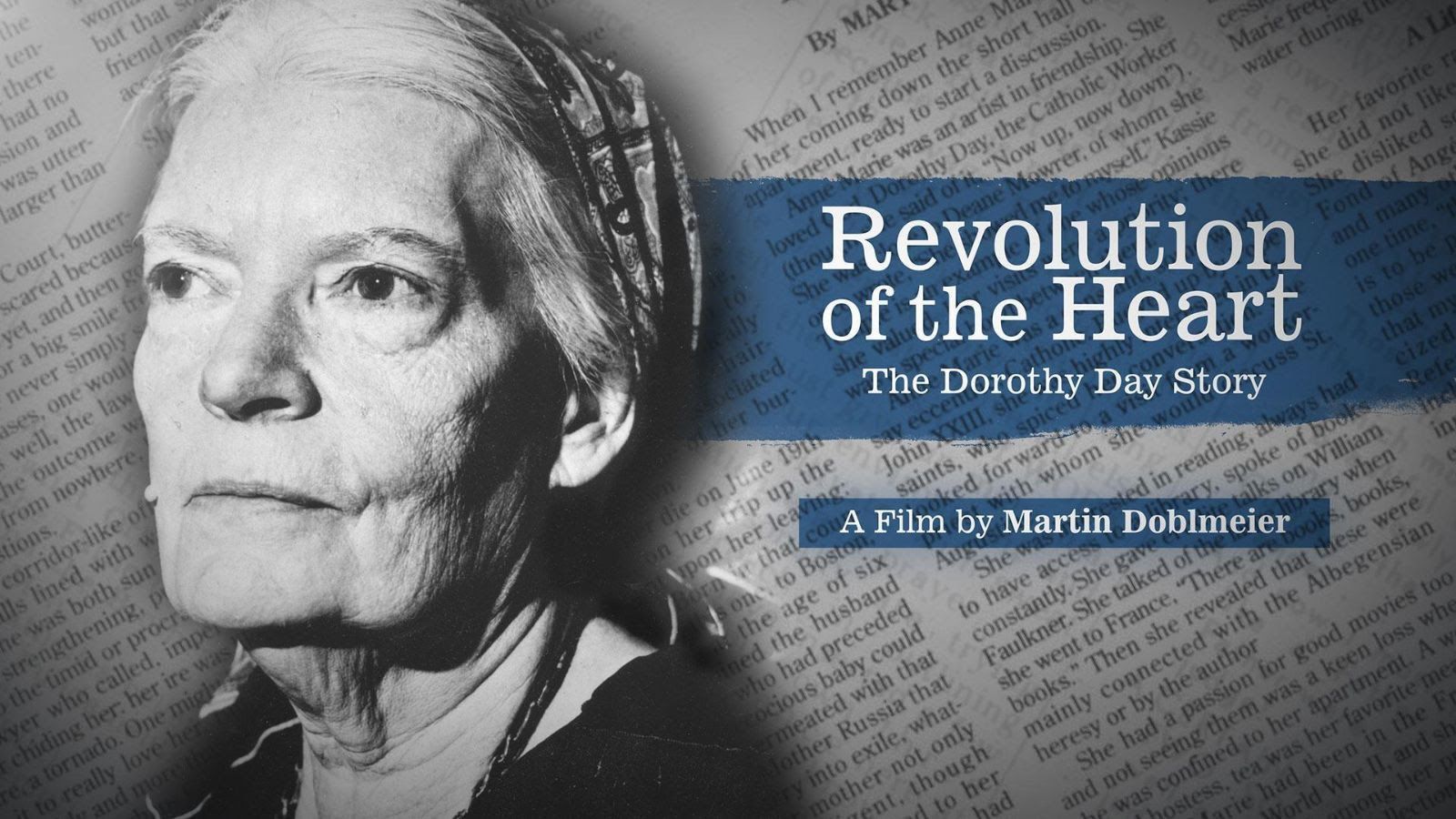
Journey Films, the production company which Martin founded in 1983, has made the entire “Prophetic Voices” series, including Revolution of the Heart: The Dorothy Day Story available to stream for free (just enter the password journey413). Whether or not you are able to join us for the lecture, we highly recommend checking out this documentary series for Holy Week and Passover!
Thinking ahead to summer, registration is open for the Dorothy Day Retreat which Martha Hennessy is hosting at Pyramid Life Center in Paradox, New York from July 21st-23rd. This special mid-week retreat will consider the question of how we are called to live as Catholics in the United States, using Dorothy’s life as a model of holiness in our own time. We especially recommend this retreat for anyone who participated in (or hoped to participate in!) our Lenten book club this year, as Robert Ellsberg’s anthology, Dorothy Day: Spiritual Writings, will guide retreat conversations on how Dorothy’s spirituality informed her life and public work for the Gospel.
Pyramid Life Center is located around a beautiful Adirondack lake with many quietly stunning coves and overlooks that are perfect for solo prayer and reflection. Dorothy heard God speaking to her through the natural world on the beaches of Staten Island; for many people, Pyramid Life Center has likewise been a place where the silence allows us to hear God more clearly. Please consider registering for this incredible opportunity for prayer and recollection with Dorothy this summer.

Prayer requests:
In this space, we often share requests for intercessory prayer from friends and Guild members around the world who are in need of miraculous intervention from God or the ordinary graces and assistance which sustain us in the daily challenges of our lives. We receive several of these requests every month and are grateful for your continued fidelity in holding them in prayer, asking Dorothy to pray alongside you.
We know that God hears and responds to our prayers in great and small ways. Just last week, a friend wrote to us to tell us that while she was helping distribute food at a small food pantry in the Catskills, she
“prayed to Dorothy to watch over all of the people who visited the pantry yesterday. Shortly thereafter, the local florist stopped by the pantry to donate fifteen beautiful bouquets. It was a first—she had never donated to the pantry before. We gave out the bouquets all afternoon. Many people said it made their day. Thank you Dorothy for this small favor!”
We love hearing these stories, and know that they happen more often than we might expect, so please do not hesitate to reach out to us if you’ve experienced any kind of special grace in your own life through Dorothy’s intercession.
This month, we would also like to share with you a short testimony from Laurence Pagoni, of Massachusetts, who first encountered Dorothy at age thirteen when he discovered his own vocation to serve others by reading her autobiography, The Long Loneliness. Now in his sixties, Laurence writes that he “attribute[s] Dorothy’s life and witness as foundational to my life and its unfolding, truly a miracle.” Laurence gave us permission to share this account of what he believes to have been Dorothy’s direct intercession on behalf of two men living with HIV in New York. In a letter to Pope Francis, which Laurence shared with us, he writes,
I visited Dorothy’s grave in 1992 at the Cemetery of the Resurrection in Staten Island, NY in celebration of my birthday, a time that was at the height of the HIV/AID pandemic, a time before the current protease inhibitor medications existed. It was a dark time, and I prayed to Dorothy to help us minister to all those who were infected by the HIV virus. At that time, I was working at the Upper Room AIDS Ministry, Inc. in Harlem, NY now called Harlem United: Community AIDS Center, a social ministry formed in the spirit of the Catholic Worker movement.
I often prayed to Dorothy Day to intercede on behalf of the many people we worked with who lived with the HIV virus that their health be restored. One was Mr. Roger Talbot of Richmond VA, whose health was extended twice aided by prayers to Dorothy. The same is true for a homeless man living with HIV that I ministered to and visited, David of New York City, whose last name is lost to me. David also passed away from HIV, but he attributed many unbelievable recoveries to his prayers to Dorothy. Both men lived much longer than their doctors expected, and longer than most others because of their prayers to Dorothy.
In Fr. Dan Berrigan, S.J.’s book, Portraits of Those I Love, chapter five is all about Dorothy, written shortly after her death. Fr. Berrigan says, “…her place in the history of the century would seem already secured.” Fr. Berrigan also states, “…she can be understood only as a Catholic Christian.” It is a beautiful essay and fully embodies Dorothy’s gifts. I hope you will take time to read it.
Thank you, Laurence, for sharing this powerful story with us. We hope that each member of the Guild will find encouragement in this testimony and support for their own prayers through Dorothy and in support of her canonization. As we approach the days of Christ’s passion and victory over death,, let us remember that God is alive and active, that the Holy Spirit is at work in the world, and that the One who went to the Cross for us will never forget the needs of our world.
Please join us in asking Dorothy’s intercession for the following individuals and families:
Robert Cox wrote to us asking for prayers for a man on death row who is scheduled to be executed by the state of Texas this month after being convicted of murder in 2006. Please keep this man, his victim, and both families in your prayers over the next few weeks, and join all of us at the Guild and the Holy Father in praying for an end to the practice of capital punishment in favor of a greater respect for the sanctity of human life.
Our South Bend Catholic Worker community would also like to ask for you to pray for one of our guests, who is reaching the end of his life and needs 24/7 care. He has no medical insurance and to this point, we have been able to keep him relatively clean and comfortable thanks to two generous donors who have provided funds to cover a safe and accessible hotel room for him for the time being, and the genuinely heroic charity of two members of our community, Royce and Emma, who have been providing the hands-on care that our guest needs in order to die with dignity. Please keep our guest, Royce, and Emma in your prayers, and ask Dorothy to be with them and intercede on their behalf as they undertake the works of mercy in some of the most difficult and distressing circumstances.
Lastly, I would like to request your prayers on behalf of two of my undergraduate students, each of whom is facing incredibly difficult personal and family circumstances with a great deal of grace. Dorothy understood the challenges faced by the youth of her own time and in the generations which followed her; please join me in asking her intercession for these two young adults.
A few words from Dorothy:
This month, to lead us into the Paschal Triduum, we would like to share a longer reflection from Dorothy’s April 1964 column, “The Mystery of the Poor.” From the Catholic Worker house on Chrystie Street, she wrote,
On Easter Day, on awakening late after the long midnight services in our parish church, I read over the last chapter of the four Gospels and felt that I had received great light and understanding with the reading of them. “They have taken the Lord out of His tomb and we do not know where they have laid Him,” Mary Magdalene said, and we can say this with her in times of doubt and questioning. How do we know we believe? How do we know we indeed have faith? Because we have seen His hands and His feet in the poor around us. He has shown Himself to us in them. We start by loving them for Him, and we soon love them for themselves, each one a unique person, most special!
In that last glorious chapter of St. Luke, Jesus told His followers, “Why are you so perturbed? Why do questions arise in your minds? Look at My hands and My feet. It is I Myself. Touch Me and see. No ghost has flesh and bones as you can see I have.” They were still unconvinced, for it seemed to good to be true. “So He asked them, ‘Have you anything to eat?’ They offered Him a piece of fish they had cooked which He took and ate before their eyes.”
How can I help but think of these things every time I sit down at Chrystie Street or Peter Maurin Farm and look around at the tables filled with the unutterably poor who are going through their long-continuing crucifixion. It is most surely an exercise of faith for us to see Christ in each other. But it is through such exercise that we grow and the joy of our vocation assures us we are on the right path…
The mystery of the poor is this: That they are Jesus, and what you do for them you do for Him. It is the only way we have of knowing and believing in our love. The mystery of poverty is that by sharing in it, making ourselves poor in giving to others, we increase our knowledge of and belief in love.
As we approach Holy Thursday, Good Friday, and the dark hours of Holy Saturday before the Easter Vigil, please remember those who are enduring long-continuing crucifixions, in our own cities, and in places around the world including Gaza, Ukraine, and Yemen. Dorothy reminds us in this column that our brothers and sisters are given to us to increase our faith. It is by knowing them, living with them and sharing both their suffering and their joy that we come to know who Christ is. Mary Magdalene’s solidarity with Christ kept her by his side and led her to follow him to the grave, where she then received the honor of becoming the first witness to the resurrection.
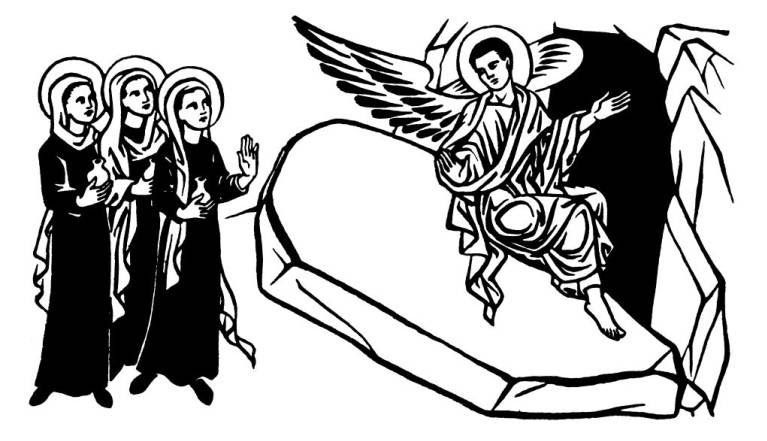
Dorothy tells us here that the reality of Christ’s passion, death, and resurrection is reenacted every day in the lives of our unhoused and vulnerable brothers and sisters. What we do for them, we do for Christ. This Holy Week, we pray that each of you might grow in solidarity with Christ’s poor and have the honor of witnessing his resurrection in them.
In peace,
Dr. Casey Mullaney, on behalf of the Dorothy Day Guild
Share this post
